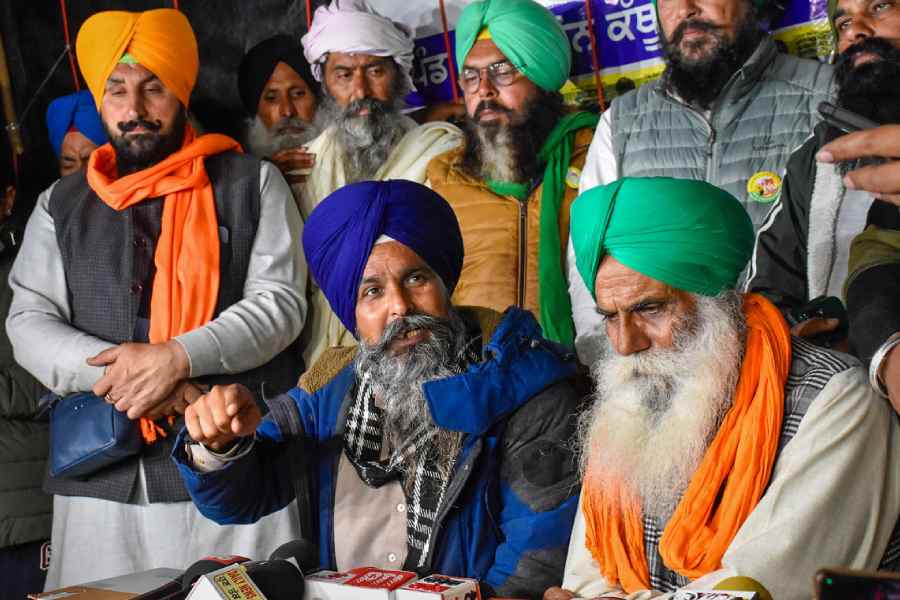Protesting farmer leaders have rejected the government’s proposal of a five-year contract to buy maize, cotton and three types of pulses at the old minimum support price.
Volatility is set to return to the borders around Delhi on the Haryana-Punjab side from Wednesday when farmers propose to resume their march.
The announcement by farmer leaders came hours after the Samyukt Kisan Morcha, an umbrella organisation of farmer unions which is not part of the current protests, also criticised the MSP proposal.
Addressing a news conference on Monday at the Shambhu border, between Punjab and Haryana, farmer leader Sarwan Singh Pandher said the proposal was not acceptable and the protesting farmers would resume their march towards Delhi in a peaceful manner from Wednesday.
Laying out the reasons for rejecting the proposal, farmer leader Jagjit Singh Dallewal said in Hindi: “The government made the proposal (on Sunday night) and we have studied it. It doesn’t make sense for the MSP to apply to only two or three crops and for the other farmers to be left to fend for themselves.”
The Centre had offered to buy five crops at MSPs for five years as a way out of the stalemate over the farmers’ demand for a law guaranteeing MSPs for 23 crops.
Initially after the offer, the Samyukta Kisan Morcha (non-political) and the Kisan Mazdoor Morcha — the two collectives at the forefront of the ongoing protest — had announced a two-day suspension of their planned march to Delhi.

Farmer leaders Sarwan Singh Pandher and Jagjit Singh Dallewal address the media at the Punjab-Haryana Shambhu border during the 'Delhi Chalo' protest march. PTI picture
They had informed the central ministers with whom they were negotiating that they would consult their unions before expressing a view on the offer.
The government’s offer was linked to its push for crop diversification. The union leaders were informed that the government was willing to purchase three pulses — tur, urad and masoor — besides cotton and maize at MSPs through central cooperatives like Nafed, NCCF and the Cotton Corporation of India for five years.
These cooperatives were to sign five-year contracts with farmers, guaranteeing to buy their produce.
The farmers are demanding legally guaranteed MSPs for the 23 crops for which the government fixes the MSPs annually. Further, they want the MSP rates to conform to a formula worked out by the Swaminathan Commission.
They are not asking the government to buy all the agricultural produce in the country at these rates, aware that it’s not practical. They want the current procurement to continue, but under a law that ensures the MSP is the benchmark so that the farmers are not forced by market forces to sell below it.
The main SKM group — from which the SKM (non-political) broke away — had rejected the five-crop, five-year proposal outright, calling it an attempt to “divert and dilute the demand of MSP @ C2 + 50 per cent (Swaminathan Commission formula that that MSP should be 1.5 times the farmer’s input costs) for all crops with guaranteed procurement….”
This group is not participating in the current agitation but has been mobilising opinion in support of the farmers’ demands with protest actions of its own.
Other farmer unions had argued that if this was the offer on the table, it should not be limited to five crops. Gurnam Singh Charuni of the Bharatiya Kisan Union (Charuni) had said the offer should be extended to oilseeds and millets too.










